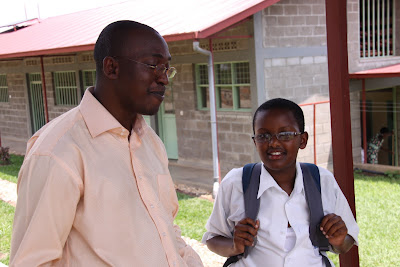


To day, Saturday afternoon, I have a two hour session with the Rugerero teaching staff. 23 teachers out of 26 have showed up and most of them on time! Could this be a cultural change in the organization?? On my agenda, two main items: (i) what would entering a performance contract with Abana entail? And (iia ) what have I bought on behalf of Abana to make teaching aids for the classroom and basic teaching books and (iib) how can they develop and use their budding resource centre.
But first I tell them about the Abana motto. ‘Helping them help themselves’ and how this can apply to the children in their classes. I also say that it is time to stop feeling sorry for themselves, to strongly believe; ‘yes, we are poor, we don’t have much material, please do it for us!’ NO! We can help you buying a few things, we can tell you one thing or two about teaching efficiency, but after that it is all in your hands. You ARE the Force! And, we, muzungus can also learn a few things from you, Africans! You know how to work together, how to support each other, how to laugh and have fun together. This is your strength, and one day, YOU to the western, civilized world to teach us what we have lost... They smile. I mean what I am saying...
I go over the six points of the contract. Basically”
1. I will go to school every day and fill out and attendance sheet
2. I will teach when I am supposed to teach
3. I will prepare my classes
4. I will attend all teacher training sessions sponsored by Abana
5. I will keep my classroom hygienic and tidy
6. I will allow the school ‘direction’ (management) to visit my classes, observe my teaching and see all relevant pedagogical documents (class diary, class register, class marks, pupils note books, Term teaching plans and lesson plans).
I give them a chance to discuss all this in small groups and make comments, criticisms, suggestions. We reconvene. They don’t have anything to add. They think it is fait dinkum, me too! I think to myself ‘if this thing works, it is more that ¾ of the battle won.
Second half of the session: the teaching resource room and staff room. ‘This is YOUR working space away from the children. I would like ALL of you to come here and feel that it is YOUR space – not only senior teachers working with senior pupils, but you, Class 1 and Class 2 teachers. You are very important’. I show them sample stationary I bought to demonsytrate how it can be used to create teaching tools. I can see that for some of them, this is a new concept, that this is a new way to look at their job... ‘Yes, there is more to teaching than to make children repeat together very loud, day in and day out “ one – two- three – four”, or “this is a book”. They realise that they might have to work harder, to be more energetic. I also promise them that they will fee emotionally rewarded when they see the children enjoy learning and actually integrate new learned stuff to their inner world... ‘Why did I buy some whitener? To recycle old French text books (which have wonderful Rwanda culture drawings) used to teach vocabulary. ‘White out ‘maison’, cuisine’, ‘jardin’ – sorry Monsieur Sarkozy you came too late to apologize- and replace by ‘house, kitchen, garden’... I also spoke how to use flashcards and how to make new ones when required... EASY! I tell them that the school will have money provided by the Rwanda government to buy more stationary. They work in group again to decide (a) what is not so useful, (b) what is useful and (c) what else they could use. They do come up with positive comments and suggestions. I tell the ‘direction’ that the staff room needs more desks, a few more chairs, so each teacher can have his/her own individual working space, which will have to be kept separated from the collective, communal space shelves, cupboards where material and books will need to be organized in a systematic manner. Collected property, shared resources! I tell them that I am very impressed that the two pairs of scissors I bought when I arrived are still here for the benefit of everyone. ‘Well done! Way to go!”
Four fifteen... we worked overtime... Time to go home and start the weekend. I feel like a beer!
Only a few more weeks of work for me here. On Monday I am expecting a big delivery of textbooks and dictionaries badly needed. A solar panel technician is coming to the school to make suggestions about what we can do when we are ready to move into that phase. I have a meeting with teacher trainers who have agreed to come and help when I am gone. I would love the parents committee to organise a ‘clean up the classrooms working bee’ on the next compulsory community work day on the last Saturday of the month.
Will I be able to pull it together? Don’t know... Where’s my beer!!!

























































